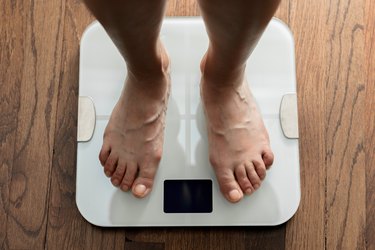
Your body is composed of numerous substances, but nothing is more fundamental and pervasive as water. It plays a role in many of your body's basic functions.
The percentage of water in your body changes daily, confusing many people who are trying to lose weight. Big drops on the scale during the first week or two of a diet are due in large part to the loss of water. After initial weight loss, water loss slows down.
Video of the Day
Video of the Day
Keep reading to learn how many pounds of water weight you have and how many you can lose in a week.
What Is Water Weight?
Water makes up about 60 percent of your body weight, according to the Mayo Clinic. You need that much of it because it's crucial for all sorts of normal processes in your body, like regulating your temperature, transporting nutrients to your cells, lubricating your joints, flushing out waste products and keeping your eyes, nose and mouth moist.
But because you're always using and replacing water, the amount of water in your body is constantly changing. In fact, your weight can fluctuate by up to 5 pounds in a given day due to water weight alone, per the National Academy of Sports Medicine (NASM).
What Causes Water Weight?
In addition to normal fluctuations in how much water you drink or how much you excrete in sweat or urine, there are some factors that cause greater water retention. This can include, according to the NASM:
- Eating too much salt
- Spending a lot of time sitting (ever notice you get swollen feet or ankles?)
- Changes in hormones around menstruation and/or pregnancy
- Certain medications, including high blood pressure treatment and antidepressants
- Certain health conditions, including heart, liver and kidney problems
How to Lose Water Weight in a Week
It's possible to lose around 10 pounds in a week, according to the Cleveland Clinic, and most of that will be water weight. But it's really not sustainable to lose that much weight that quickly. In fact, losing more than 2 pounds a week will mean you're losing water and breaking down muscle instead of shedding fat, according to the American Academy of Family Physicians.
Dramatic water weight loss tends to occur during the first week or two of a new diet or exercise regimen. You may lose very little water in subsequent weeks — a few pounds at most — and you may even gain some of that water weight back.
Here are the safest and most reliable ways to lose water weight fast.
1. Drink More Water
It might seem counterintuitive, but you'll actually lose water weight by drinking more water. That's because when you're dehydrated, your body holds onto (or retains) more water, according to the NASM. Aim for 11 to 15 cups of water a day, which includes black tea and coffee as well as water you get from foods.
2. Cut Back on Sodium
Eating too much salt can make water retention worse, according to the Mayo Clinic. Aim for 2,300 milligrams of sodium per day or less, per the FDA.
3. Get Plenty of Potassium and Magnesium
Potassium and magnesium are electrolytes, compounds that help keep your body's fluid levels in balance, per the NASM. This leads to optimal hydration, so you'll be less likely to retain water. Start with foods high in potassium and magnesium; talk to your doctor before considering magnesium supplements, per the Mayo Clinic.
4. Exercise Regularly
Moving more can help prevent the kind of water retention that results in swollen legs and ankles, per the NASM. Plus, the more you move, the more water weight you'll lose via sweat. Just make sure you're replenishing your fluid stores to avoid dehydration.
When to Talk to a Doctor
A little water retention isn't usually anything to worry about. But, according to the Cleveland Clinic, it's time to seek medical attention if you have visible swelling along with:
- Pain and discoloration
- Open sores
- Trouble walking
- Shortness of breath
- Swelling on only one side
If you don't have any symptoms but are curious for more personalized advice on losing water weight, talk to your primary care physician or a registered dietitian for a diet plan tailored to your tastes and goals.
FAQ
Common Questions
How can you tell if it's water weight or fat?
It's hard to tell when you're losing pounds, but if it happens quickly and dramatically, it's likely water weight, according to the NASM. Same goes for gaining weight: Water weight can fluctuate by several pounds each day, but fat takes longer to build up.
What are the worst foods for water retention?
The foods to limit are those that are high in salt, such as processed meats, canned soups, certain condiments, packaged salty snacks and certain cheeses.
What foods get rid of water weight?
You may not see a dramatic difference on the scale in a week from diet changes alone. But your best bet is eating plenty of water-rich fruits and veggies, such as watermelon, cucumbers, grapes, asparagus and pineapple, according to the Cleveland Clinic.
- Mayo Clinic: "Water: Essential for your body"
- NASM: "HOW TO LOSE WATER WEIGHT EFFECTIVELY"
- Cleveland Clinic: "What Happens in Your Body When You Lose 10 Pounds in a Week"
- AAFP: "What It Takes to Lose Weight"
- Mayo Clinic: "Water retention: Relieve this premenstrual symptom"
- FDA: "Sodium in Your Diet"
- Cleveland Clinic: "Edema"
- Cleveland Clinic: "Natural Diuretics to Reduce Water Retention"